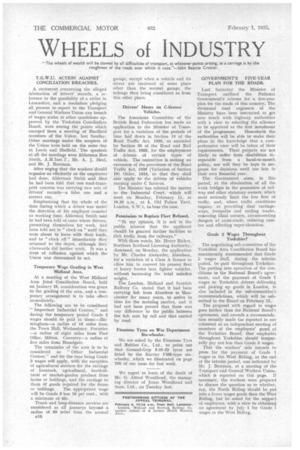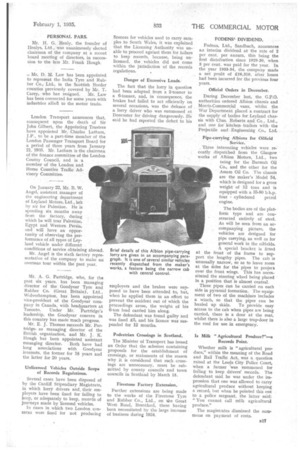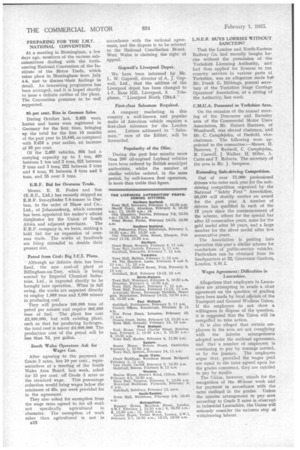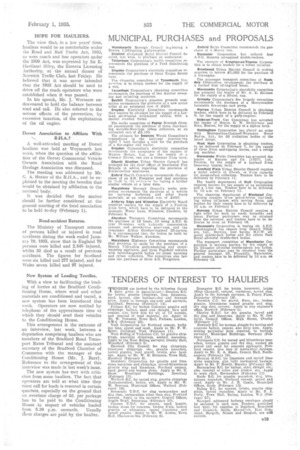WHEELS of INDUSTRY "The wheels of wealth will be slowed
Page 26

Page 27

Page 28

Page 29

If you've noticed an error in this article please click here to report it so we can fix it.
by all difficulties of transport, at whatever points arising, as a carriage is by the roughness of the roads over which it runs."—John Beattie Crozier.
T.G.W.U. ACTION AGAINST CONCILIATION BREACHES.
A statement concerning the alleged fabrication of drivers' records, a re ference to the possibility of a strike in Lancashire, and a resolution pledging all present to report to the Transport and General Workers Union any breach of wages scales or other conditions approved by the Yorkshire Conciliation
Board, were among thepoints which emerged from a meeting of Bradford members of the Union, last Sunday. Other meetings under the auspices of the Union were held on the same day at Leeds and Sheffield. The speakers at all the meetings were Alderman Ben Smith, A.M.Iiast.T., Mr. A. J. Heal, and Mr. J. Bowman.
After urging that the workers should organize as efficiently as the employers had done, Alderman Smith said that he had been told that one road-transport concern was carrying two sets of drivers' records—a false one and a correct one.
Emphasizing that the whole of the time during which a driver was under the direction of his employer counted as working time, Alderman Smith said he had been told of cases where drivers, presenting themselves for work, had been told not to "clock on" until they. were about to leave with their loads, and to "clock off" immediately they returned to the depot, although they afterwards did further work. It was a • form of collusion against which the • Union was determined to act.
Temporary Wage Grading in West Midland Area.
At a meeting of the West Midland Area Joint Conciliation .Board, held on January 25, consideration was given to the grading of the area, and a temporary arrangement is to take effect immediately.
The following are to be considered " Important Industrial Centres," and during the temporary period Grade 2 wages should be paid in them:—Birrniugharn—a radius of 16 miles from the Town Hall, Wednesbury. Potteries —a radius of eight miles from Post Office, Milton. Coventry—a radius of five miles from Broadgate.
The remainder of the area is to be considered as "Other Industrial Centres," and for the time .being Grade 3 wages will apply, with the exception of agricultural services for the carriage of livestock, agricultural, horticultural or market-garden produce from farms or holdings, and the carriage to them of goods required for the farms or holdings:The appropriate wage will be Grade 3 less 10 per cent., with a minimum of 45s.
Trunk and long-distance services are considered as all journeys beyonda radius of 65 miles from the normal nit; garage, except when a vehicle and its driver are stationed at some place other than the normal garage, the mileage then being considered as from this other place.
Drivers' Hours on C.licence Vehicles.
The Associates Committee of the British Road Federation has made an application to the Minister of Transport for a variation of the periods of time laid down in Section 19 of the Road TraffiC Act, 1930, as amended by Section 31 of the Road and Rail Traffic Act, 1933, for the employment of drivers of certain types of vehicle. The committee is seeking an extension of the provisions of the Road Traffic Act, 1930 (Variation of Section 19) Order, 1934, so that they shall also apply to the drivers of vehicles running under C licences.
The Minister has referred the matter to the Industrial Court, which will meet on Monday, February 11, at 10.30 a.m., at 5, Old Palace Yard, London, S.W.1, to hear the case.
Permission to Replace Fleet Refused.
"in soy opinion, it is not in the public interest that the applicant should be granted further facilities to filch traffic from the railways."
With those words, Mr. Henry Riches, Northern Scotland Licensing Authority, dismissed, on Monday, the application by Mr. Charles Alexander, Aberdeen, for a Variation of a Class A licence to allow him to convert his present fleet of heavy lorries into lighter vehicles. without increasing the total -unladen weight. •
The London, Midland and Scottish Railway Co. stated that it had been carrying fish from Aberdeen to Manchester for many years, to arrive in time for the morning market, and it had not been proved that there was any difference to the public between the fish sent by rail and that carried by road.
Firestone Tyres on War Department Six-wheeler.
We are asked by the Firestone Tyre and Rubber Co., Ltd., to point out that Ground-Grip 9.00-22 tyres are fitted to the Karrier FM6-type sixwheeler, which we illustrated on page 799 of our issue for last week.
We regret to learn, of the death of Mr. G. Alfred Woodheacl, the managing director of Jonas Woodhead and Sons, Ltd., on Tuesday last. GOVERNMENTS F IVE -YE AR PLAN FOR THE ROADS.
Last Saturday the Minister of Transport outlined the National Government's scheme for a five-year plan for the roads of this country. The divisional road engineers of the Ministry have been instructed to get into touch with highway authorities with a view to selecting the schemes to be approved as the first instalment of the programme. Henceforth the authorities will be able to make their plans in the knowledge that a comprehensive view will be taken of their requirements. Their projects are not likely to suffer from disabilities inseparable from a hand-to-mouth policy, nor will they be kept in suspense for decisions until too late in their own financial year.
The Government aims, in this period, at the elimination of all the weak bridges in the possession of railway and other statutory owners, which most seriously limit the free flow ot traffic, and, where traffic conditions require, at providing dual carriageways, footpaths and cycling tracks, removing blind corners, circumventing dangers at cross-roads, reducing camber and effecting super-elevation.
Grade 2 Wages Throughout Yorkshire.?
The negotiating sub-committee of the Yorkshire Area Conciliation Board has unanimously recommended that Grade wages shall, during the interim period, be paid throughout Yorkshire. The putting into operation of the conditions in the National Board's agreement, and the payment of Grade 1 wages to Yorkshire drivers delivering and picking up goods in London, is also included in the sub-committee's recommendations, which will be submitted to the Board on February '12.
The proposal with regard. to wages goes farther than the National Board's agreement, and exceeds a recommendation recently made (as reported in our columns) at an independent meeting of members of the employers' panel_ of the Yorkshire 13oard; that employer's throughout Yorkshire should temporarily pay not less than Grade 3 wages.
That the workers' side intends to press for the payment of Grade I wages in the West Riding, at the end of the interim period, was indicated by Mr. J. Bowman, at a meeting of the Transport and General Workers Union, which is reported on this page. If necessary, the workers were prepared to discuss the question as to whether, say, the Ncirth Riding should be put into a lower wages grade than the West Riding, but he asked for the support of employees, with a view to obtaining an agreement by July I for Grade I wages in the West Riding.
PERSONAL PARS.
Mr. H. G. Henly, the founder of Henlys, Ltd., was unanimously elected chairman of the company at a recent board meeting of directors, in succession to the late Mr. Frank Hough.
a Mr. D. M. Law has been appointed to represent the India Tyre and Rubber Co., Ltd., in the• Scottish Border counties previously covered by Mr. T. Carey, who has resigned. Mr. Law has been connected for some years with industries allied to the motor trade.
London Transport announces that, consequent upon the death of Sir John Gilbert, the Appointing Trustees have appointed Mr. Charles Latham, J.P., to be a part-time member of the London Passenger Transport Board lor a period of three years from January 21, 1935, Mr. Latham is the chairman of the finance committee of the London County Council, and is a member of the London and Home Counties Traffic Advisory Committee.
On January 22, Mr. B. W. Angel, assistant manager of the engineering department of Leyland Motors, Ltd., left by air for Palestine. He is spending six months away from the factory, during which he will tour Palestine, Egypt and Western Persia, and will have an opportunity of observing the performance of all types of Leyland vehicle Under different conditions of service obtaining abroad.
Mr. Angel is the sixth factory representative of the company to make an overseas tour within the past year.
Mr. A. G. Partridge, who, for the past six years. has been managing director of the Goodyear Tyre and Rubber Co. (Great Britain), Ltd., Wolverhampton., has been appointed vice-president of the Goodyear company in Canada, with headquarters at Toronto. Under Mr. Partridge's leadership, the Goodyear concern in this country has made much progress.
Mr. E. J. Thomas succeeds Mr. Partridge. as managing director of the British organization, and Mr. J. K. Hough has been appointed assistant managing director. Both have had long associations with Goodyear interests, the former for 18 years and the latter for 20 years.
Unlicensed Vehicles Outside Scope of Records Regulations.
Several cases have been disposed of by the Cardiff Stipendiary Magistrate, in which lorry drivers and, their employers have been fined for failing to keep, or adequately to keep, records of journeys made by licensed vehicles.
In cases in which two London concerns were fined for not producing licences for vehicles used to carry samples to South Wales, it was explained that the Licensing Authority was unable to proceed against them for failure to keep records, because, being unlicensed, the . vehicles did not come within the jurisdiction of the records regulations.
Danger of Excessive Loads.
The fact that the lorry in question had been adapted from a 2-tanner to a 6-tonner, and, in consequence, the brakes had failed to act efficiently on several occasions, was the defence of a lorry driver who was summoned at Doncaster for driving dangerously. He said he had reported the defect to his employers and the brakes were supposed to have been attended to, but, when he applied them in an effort to prevent the accident out of which the proceedings arose, the weight of his 6-ton load carried him along.
The defendant was found guilty and was fined £5, and his licence was suspended for 12 months.
Pedestrian Crossings in Scotland.
The Minister of Transport has issued an Order that the schemes containing proposals for the establishment of crossings, or statements of the reason why it is considered that such crossings are unnecessary, must be submitted by county councils and town councils in Scotland by March 15.
Firestone Factory Extension.
Further extensions are being made to the works of the Firestone Tyre and Rubber Co., Ltd., on the Great West Road, Brentford, these having been necessitated by the large increase of business during 1934. FODENS'DIVIDEND.
Fodens, Ltd., Sandbach, announces an interim dividend at the rate of 2 per cent. per annum, this being the first distribution since 1929-30, when 3_ per cent. was paid for the year. In the year 1933-94, the company made a net profit of £16,310, after losses had been incurred for the previous four years.
Official Orders in December.
During December last, the. G.P.O. authorities ordered Albion chassis and Morris-Commercial vans, whilst the War 'Department placed a contract for the supply of bodies for Leyland chassis with Chas. Roberts and -Co., Ltd., and one for kitchen trailers with the Projectile and Engineering Co., Ltd.
Pipe-carrying Albions for Oilfield Service.
Three interesting vehicles were recently dispatched from the Glasgow works of Albion Motors, Ltd., two being for the Burmah Oil Co., and the other for the Assam Oil Co. The chassis are the maker's Model 54, which is designed for a gross weight. of 12 tons and is equipped with a 35-80 b.h.p.
four cylindered petrol engine.
The bodies are of the platform type and are constructed entirely . of steel. As will be seen from an accompanying picture, the vehicles are designed for pipe carrying, as well as for general work in the oilfields. A special bracket is fitted at the front of the frame to support the lengthy pipes. The cab is unusually narrow, so as to leave room at the sides for the pipes to project over the front wings. This has necessitated the steering wheel being placed in a position that is almost central.
Three pipes can be carried on each side in pyramid formation. The equipment of two of the machines includes a winch, so that the pipes can be hauled up skids. To provide easy access to the cab when pipes are being carried, there is a door at the rear, whilst there is also a large trap-door in the roof for use in emergency. • Is Milk "Agricultural Producer—a Records Point.
Whether milk is "agricultural produce," within the meaning of the Road and Rail Traffic Act, was a question raised at the Leeds City Police Court, when a farmer Was summoned for failing to keep drivers' records. The defendant said, he was under the impression that one was allowed to carry agricultural produce without keeping a record, but when he pointed this out to a police sergeant, the latter said: "You cannot call milk agricultural produce."
The magistrates dismissed the summons on payment of costs, PREPARING FOR THE I.M.T. NATIONAL CONVENTION.
At a meeting in Birmingham, a few days ago, merebers of the various subcommittees dealing with the forthcoming National Convention of the Institute of the Motor Trade, which takes place in Birmingham from July 4-6, met to discuss !their findings in detail. An interesting programme has been arranged, and it is hoped shortly to issue a definite outline of the plans. The Convention promises to be well supported.
95per cent. Rise in German Sales.
During October last, 2,493 vans, lorries and buses were registered in Germany for the first time, bringing up the total for the first 10 months of the past year to 18,446, as compared with 9,459 a year earlier, an increase of 95 per cent
Of the 2,493 vehicles, 864 had a carrying capacity up to 1 ton, 460 between 1 ton and 2 tons, 821 between 2 tons and 3 tons, 222 between 3 tons and 4 tons, 91 between 4 tons and 5 tons, and 35 over 5 tons.
E.R.F. Bid for Overseas Trade.
Messrs. E. R. Foden and Son (E.R.F., Ltd.) has recently shipped an E.R.F. five-cylinder 7-8-tonner to Durban, to the order of Blane and Co, Ltd., of Johannesburg, which concern has been appointed the maker's officialdistributor for the Union of South Africa and adjacent provinces. The E.R.F. company is, we learn, making a bokl bid for an expansion of overseas trade. The works at Sandbach are being extended to double their present size.
Petrol front Coal: Big I.C.I. Plans.
• Although no definite date has been fixed, the new coal-oil plant at Billingham-on-Tees, which is being erected by Imperial Chemical Industries, Ltd., is expected shortly to be brought into operation. When in full swing, the works are expected directly to employ 1,000 men and 2,000 miners in producing coal.
They will produce 100,000 tons of petrol per annum and require 365,000 tons of fuel. The plant has cost £2,500,000, but with existing plant, such as that for producing hydrogen, the total cost is nearer £4,000,000. The production cost of the petrol will be less than 7d. per gallon.
South Wales Operators Ask for • Wages Cut.
After agreeing to the payment of Grade 3 rates, less 10 per cent., representatives at a meeting of the South Wales Area Board, last week, asked for 15 per cent. off Grade 3 rates as the standard wage. This percentage reduction would bring wages below the minimum of 45s. per week provided for in the agreement.
They also asked for exemption from the wage rates agreed to for all work not specifically agricultural in character. The exemption of work other than agricultural is not in n18 accordance with the national agreement, and the dispute is to be referred to the National Conciliation Board. West Wales is claiming the right of appeal.
Gupwell's Liverpool Depot.
We have been informed by Mr. L. W. Gupwell, director of A. J. Cupwell, Ltd., that the address of the Liverpool depot has been changed to
1-7, Rose Hill, Liverpool, 3. Telephone, "Liverpool North 1784-5."
First-class Salesman Required.
A company marketing in this country a well-known and popular make of American vehicle requires a first-class salesman for the London
area. Letters addressed to "Salesman," care of the Editor, will be forwarded.
Popularity of the Oiler.
During the past four months more than 200 oil-engined Leyland vehicles have been ordered by British municipal authorities, whilst the number of similar vehicles ordered, in the same period, by well-known fleet operators, is more than treble that figure. L.N.E.R. BUYS LORRIES WITHOUT SANCTION?
That the London and North-Eastern Railway Co. had recently bought lorries without the permission of the Yorkshire Licensing Authority, and had then applied for licences to run country services in various parts of Yorkshire, was an allegation made her,. Mr. Frank G. Bibbings, general secretary of the Yorkshire Stage Carriage Operators' Association, at a sitting of the Authority, last week.
C.NLU.A. Personnel in Yorkshire Area.
On the occasion of the annual meeting of the Doncaster and Barnsley area of the Commercial Motor Users Association, Mr. Hubert Burrows, of Wombwell, was elected chairman, and Mr. C. Camplejohn, of Darfield, vicechairman. The following were appointed to the committee :—Messrs. H. Burrows, J. Rodwell, C. Camplejolm, R. Caswell, J. Walker, H. Miller, A. Cutts and T. Roberts. The secretary of the area is Mr. J. Sampson.
Extending Safe-driving Competition.
Out of over 75,000 professional drivers who enter each year for the safedriving competition organized by the National "Safety First" Association, 50,000 will shortly receive an award for the past year. A number of drivers has qualified in each of the IT years since the commencement of the scheme, others for the special bar after 15 consecutive years, some for the gold medal after 10 years, and a large number for the silver medal after five consecutive years.
The Association is putting into operation this year a similar scheme for • conductors of public-service vehicles. Particulars can be obtained from its headquarters at 52, Grosvenor Gardens, London, SAVA..
Wages Agreement: Difficulties in Lancashire.
Allegations that employers in Lancashire are attempting to evade a clear agreement on the question of grading have been made by local officials of the Transport and General Workers Union. If the employers do not show a willingness to dispose of the question, it is suggested that the Union will be compelled to take action.
It is also alleged that certain employers in the area are not complying with the interim arrangements adopted under the national agreement, and that a number of employers is continuing to pay by tonnage carried. or by the journey. The employers argue that, provided the wages paid are equal to the rates agreed upon for the grades concerned, they are entitled to pay by results,
The Union, however, stands for the recognition of the 48-hour week and for payment in accordance with the rates outlined in the grades. Unless the interim arrangement to pay men according to Grade 2 rates is observedin industrial Lancashire, the Union will seriously consider the extreme step of withdrawing labour. HOPE FOR HAULIERS.
The view that, in a few years' time. hauliers would be as comfortable under the Road and Rail Traffic Act, 1933, as were coach and bus operators under the 1930 Act, was expressed by Sir E. Haviland Riley, the Eastern Licensing Authority, at the annual dinner of Norwich Traffic Club, last Friday. He believed that it was never intended that the 1933 Act should be used to drive off the roads operators who were
established when it was passed.
In his speech, Mr. J. Worssam endeavoured to hold the balance between road and rail. He also referred to the serious effects of the prevention, by excessive taxation, of the exploitation of the oil engine.
Dorset Association to Affiliate With R.H.A.?
A well-attended meeting of Dorset hauliers was held at Weymouth last week, when the question of the affiliation of the Dorset Commercial Vehicle Owners Association with the Road Haulage Association was discussed.
The meeting was addressed by Mr. G. A. Hotter of the R.II.A., and he explained to the meeting the benefits that would be obtained by affiliation to the national body.
It was decided that the matter should be further considered at the general meeting of the local association to be held to-day (February 1).
Road-accident Returns.
The Ministry of Transport returns of persons killed or injured in road accidents during the week ended January 19, 1935, show that in England 70
persons were killed and 2,848 injured,
whilst 32 died as a result of previous accidents. The figures for Scotland were six killed and 277 injured, and for Wales seven killed and 97 injured.
New System of Loading Textiles,
With a view to facilitating the loading of lorries at the Bradford Conditioning House, where wool and other materials are conditioned and tested, a new system has been introduced this week. Operators are now notified by telephone of the approximate time at which they should send their vehicles to the Conditioning House.
This arrangement is the outcome of an interview, last week, between a deputation comprising hauliers who are members of the Bradford Road Transport Rates Tribunal and the assistant secretary of the Bradford Chamber of Commerce with the manager of the Conditioning House (Mr. J. Barr). Reference to the arrangement of this interview was made in last week's issue.
The new system has met with criticism from some hauliers. The fact that operators are told at what time they must call for toads is resented in certain quarters, especially on the ground that an overtime charge of 3d. per package has to be paid to the Conditioning House in respect of vehicles loaded from 5.30 p.m. onwards. Usually diese charges are paid by the haulier.




















































































